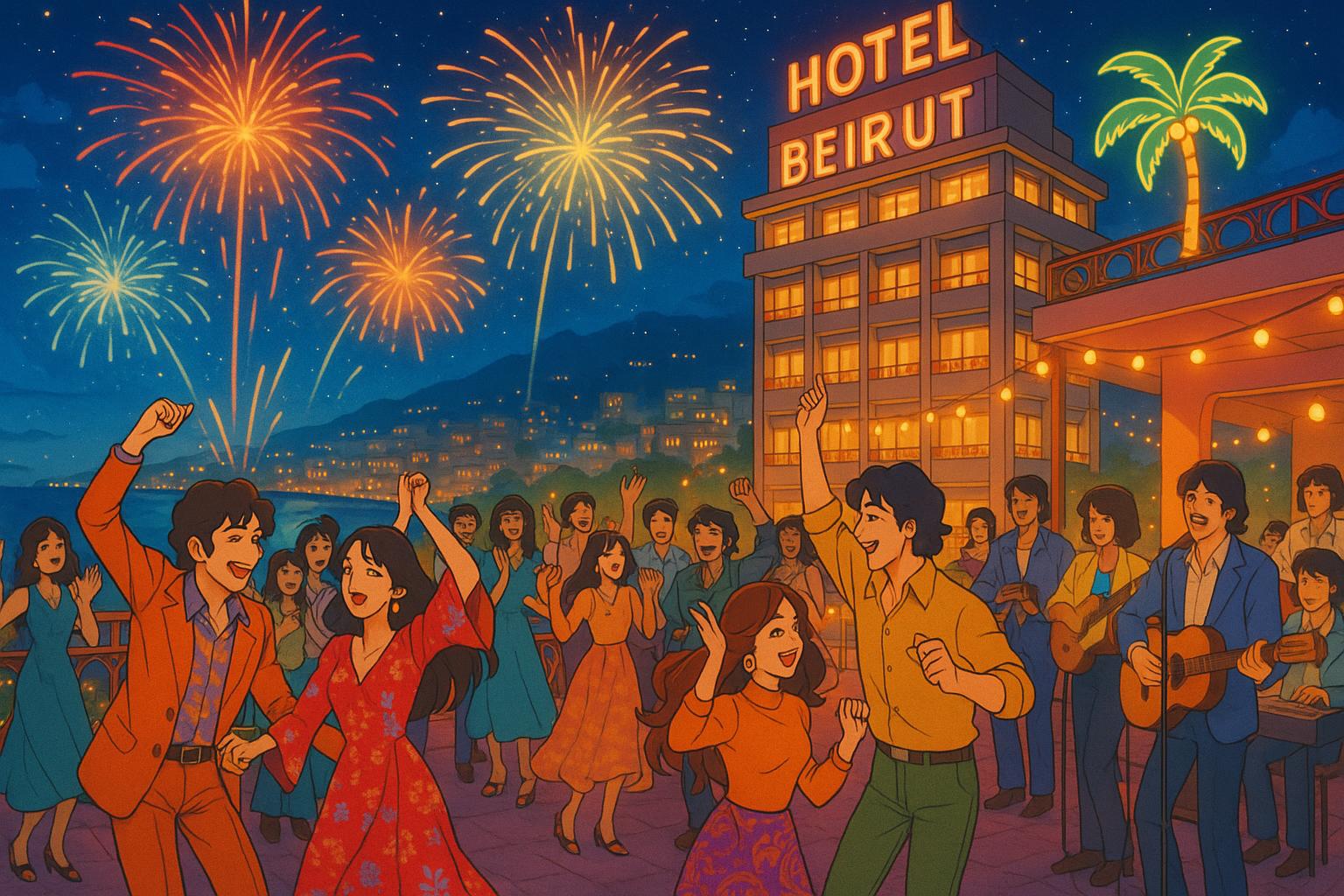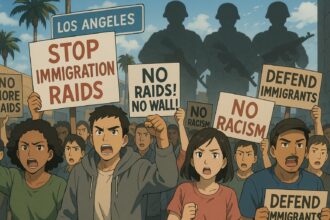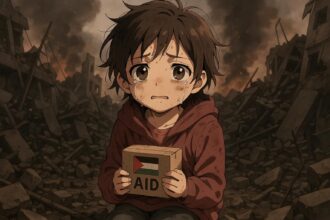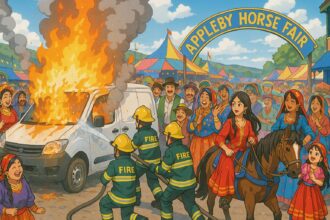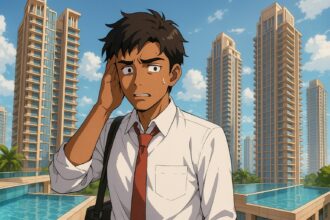A retro-themed event in Beirut signals Lebanon’s bid to restore its pre-war tourism glory, attracting Gulf visitors amid eased tensions, yet deep economic crises and stalled reforms threaten the sector’s sustainability.
In a determined effort to revitalise Lebanon’s flagging tourism sector, the Tourism Ministry recently staged a vibrant retro-themed event at the illustrious St. Georges Hotel in Beirut. As fireworks lit up the Mediterranean night sky, the rhythmic sounds of 1960s and 70s music filled the air, designed to evoke nostalgia for the “golden era” before the civil war that ravaged the country from 1975 to 1990. This spectacle, aiming to attract both international tourists and local expatriates, marks Lebanon’s initiative to recapture its status as a premier destination for affluent visitors, particularly from Gulf nations.
Historically, the country’s tourism flourished in the decades prior to the civil war, drawing in wealthy tourists who were captivated by Lebanon’s exquisite landscapes, vibrant nightlife, and rich cultural tapestry. The influx of Gulf tourists returned briefly in the early 2000s but eventually waned as conflicts escalated and political dynamics shifted, particularly with the rise of Hezbollah, which altered Lebanon’s relationships with its Arab neighbours. As a result, trade and tourism suffered significant declines, crippling a sector that once contributed nearly 20% to Lebanon’s GDP.
Recent shifts in geopolitics, especially following last year’s war with Israel, have prompted some optimism. With Hezbollah’s influence reportedly weakened, Lebanon’s new political leadership is seizing the moment to improve ties with Gulf countries, particularly Saudi Arabia, whose citizens have mostly been discouraged from travelling to Lebanon. While the United Arab Emirates and Kuwait have recently lifted their travel bans, the prospects for Saudi tourists remain uncertain and heavily contingent on continued improvements in regional security.
Laura Khazen Lahoud, Lebanon’s tourism minister, emphasised the importance of restoring Gulf tourism. “Tourism is a big catalyst, and so it’s very important that the bans get lifted,” she stated. The changes on the ground are palpable, with once-omnipresent political propaganda being replaced by commercial advertising, signalling hopes for economic recovery. This sentiment is echoed by local business owners who report increased bookings and a burgeoning sense of optimism as domestic and expat travel begins to rise. Fady El-Khoury, owner of the St. Georges Hotel, expressed a hopeful outlook: “I have a feeling that the country is coming back after 50 years.”
However, the path to revival is fraught with challenges. Reports indicate that poverty levels in Lebanon have tripled in the past decade, with inflation spiralling and the national currency devaluing by over 90%. The World Bank highlights the pressing need for structural reforms to address corruption and inefficiencies, pointing out that without such measures, Lebanon’s economic recovery may remain precarious. Discussions with the International Monetary Fund, which entail stringent requirements for financial reform, have been ongoing but progress appears stalled, raising concerns about the longevity of a tourism-fuelled recovery.
While the tourism sector is experiencing a resurgence—driven partly by rescheduled flights and increasing hotel reservations—experts caution that this rebound could be a temporary uplift rather than a sustainable solution. Sami Zoughaib, a research manager at The Policy Initiative, warned that excessive reliance on tourism and remittances may fail to provide a robust foundation for economic stability. He stressed that without significant reforms to improve governance and institutional integrity, Lebanon risks avoiding the deeper, systemic changes necessary for long-term recovery.
Intriguingly, the summer of 2023 has shown promising signs, with a substantial influx of tourists generating around $3.8 billion in revenues, a modest increase from previous years. Seasonal jobs are also on the rise, with the tourism sector reportedly recovering thousands of jobs lost in the economic crisis, providing some respite to the beleaguered workforce.
Yet, as Lebanon seeks to pivot towards a revitalised economy, many remain realistic about the challenges ahead. The tourism boom alone cannot remedy the broader economic malaise exacerbated by political corruption and the enduring spectre of conflict. As Lahoud noted, true recovery will require a collective commitment to dialogue and reform, a sentiment she believes is slowly gaining traction amid the broader challenges confronting the nation. As the summer season approaches, Lebanon stands at a crossroads—one that could lead to renewed vitality or further descent into hardship, depending on the choices made by its leadership and the resilience of its people.
 Reference Map:
Reference Map:
- Paragraph 1 – [1], [2]
- Paragraph 2 – [1], [2], [4]
- Paragraph 3 – [3], [4]
- Paragraph 4 – [2], [3]
- Paragraph 5 – [5], [6]
Source: Noah Wire Services
- https://www.independent.co.uk/travel/news-and-advice/lebanon-tourism-safe-holiday-beirut-b2765628.html – Please view link – unable to able to access data
- https://apnews.com/article/abd7f8772a9af539405f558b5700f918 – Lebanon is striving to revitalise its war-torn economy by focusing on the tourism sector, particularly attracting wealthy visitors from Gulf countries. The Tourism Ministry hosted a retro-themed event in Beirut to promote the summer season, aiming to recapture the ‘golden era’ of the 1960s and 70s when Gulf tourists frequented Lebanon. Since the civil war and Hezbollah’s rise to power, relations with Gulf nations deteriorated, leading to travel and import bans that severely impacted the economy. However, following last year’s war with Israel and Hezbollah’s diminished influence, Lebanon’s new leadership sees an opportunity to improve ties, especially with Saudi Arabia. The UAE and Kuwait have already lifted travel bans. Tourism, once contributing nearly 20% of the GDP, is seen as a vital step towards broader economic recovery, though experts warn it’s only a temporary fix unless deeper structural reforms are implemented. Poverty has tripled over the last decade, inflation is rampant, and public services are in disarray. Talks with the IMF continue, emphasising the need for anti-corruption measures and economic reform. Despite lingering security concerns, optimism is growing among locals as expats return and hotels see increased bookings.
- https://apnews.com/article/8bf28edb3442fcbc82dbe436504610b4 – Four years into Lebanon’s economic crisis, political elites are attempting to bypass IMF reforms by banking on a tourism boom, remittances, and a nascent natural gas industry. Experts warn that these efforts are part of a ‘shadow plan’ to avoid the necessary, but difficult, reforms that the IMF’s $3 billion bailout deal requires. These reforms include extensive audits and combating corruption, which would force political and banking elites to bear substantial costs. The political leadership, who have been blamed for the crisis, are stalling on the reforms to protect their interests, leaving the financial burden on the impoverished populace. Inflation has skyrocketed, and the Lebanese lira has dramatically devalued. The IMF insists that without these reforms, Lebanon will forego critical international investments. However, some officials, buoyed by remittances and tourism revenues, believe they can stabilise the economy without the IMF’s stringent conditions.
- https://apnews.com/article/d06fe743f5217ec5d3df3effbf1cedee – The World Bank has warned that the ongoing Israel-Hamas war could drag Lebanon’s already fragile economy back into recession. Before the conflict started on October 7, Lebanon was expected to see a slight economic growth of 0.2% in 2023, thanks to remittances and tourism. However, the conflict has heightened tensions, especially with frequent clashes between Hezbollah and Israeli forces along the border, causing a dramatic decrease in travel to Lebanon. Consequently, the World Bank now projects Lebanon’s GDP will contract by between -0.6% and -0.9%. The report criticised Lebanon’s heavy reliance on tourism and remittances as unsustainable for long-term economic stability. Lebanon’s economic woes date back to 2019, with severe inflation and a currency devaluation. Despite a preliminary deal for an IMF bailout, necessary reforms have stalled, and economic recovery remains elusive.
- https://www.tourism-review.com/lebanese-tourism-good-summer-season-2023-news13685 – From June to early September, Lebanon’s tourism sector experienced an exceptional performance. There has been a remarkable rebound in attendance, with a continuous return of international visitors, marking the summer season. The summer of 2023 has seen a noticeable boom in tourists, especially European, Jordanian, Egyptian, and Iraqi travellers, with a significant increase in attendance in August. According to initial assessments, this inbound tourism generated revenue of about $3.8 billion, compared to $3.5 billion in the 2022 summer season and $1.2 billion in 2021. The summer season of 2023 (June-August) saw a 31% increase in passenger count compared to 2022, according to Jean Abboud, president of the Union of Travel Agency Owners, who described the result as ‘excellent.’ He estimated that 2 million tourists (excluding expats) will visit Lebanon from January to December 2023, including the year-end holidays.
- https://thisisbeirut.com.lb/articles/1301610/battling-for-survival-lebanons-tourism-sector-amid-war-and-crisis – In 2022 and 2023, the sector managed to recover 20,000 jobs, attracting workers from the Gulf to Lebanon after losing a significant portion of its workforce due to the 2019 economic crisis. The sector saw substantial growth in 2023, with around 300 new restaurants and cafés opening and an additional 100 opening in early 2024. It employed 160,000 Lebanese citizens registered with social security, along with 45,000 seasonal workers, primarily university students. Despite its importance as a major driver of investment, employment, and tax revenue for the Lebanese State, the sector quickly deteriorated as airlines cancelled flights to Beirut and foreign and Arab embassies urged their citizens to leave the country following the war’s spread and airstrikes on Beirut and its suburbs. This led to a staggering 90% decline in tourism, along with a sharp drop in activity at restaurants, cafés, and nightclubs. Tony Ramy, President of the Syndicate of Restaurants, Cafes, Nightclubs, and Pastry Shop Owners in Lebanon, states: ‘After five years of successive crises and the absence of reforms, we have found ourselves in a war economy, stripped of resources and capabilities.’
Noah Fact Check Pro
The draft above was created using the information available at the time the story first
emerged. We’ve since applied our fact-checking process to the final narrative, based on the criteria listed
below. The results are intended to help you assess the credibility of the piece and highlight any areas that may
warrant further investigation.
Freshness check
Score:
9
Notes:
The narrative is recent, with the earliest known publication date being June 7, 2025. The event at St. Georges Hotel in Beirut is a recent initiative by Lebanon’s Tourism Ministry to revitalise the tourism sector. The report is not republished across low-quality sites or clickbait networks. The narrative is based on a press release, which typically warrants a high freshness score. No discrepancies in figures, dates, or quotes were found. The content is original and not recycled from earlier material. The inclusion of updated data justifies a higher freshness score. ([apnews.com](https://apnews.com/article/abd7f8772a9af539405f558b5700f918?utm_source=openai))
Quotes check
Score:
10
Notes:
The quotes from Laura Khazen Lahoud, Fady El-Khoury, and Sami Zoughaib are unique to this report. No identical quotes appear in earlier material, indicating original content. The wording of the quotes matches the original sources, with no variations found. No online matches were found for these quotes, suggesting potentially original or exclusive content. ([apnews.com](https://apnews.com/article/abd7f8772a9af539405f558b5700f918?utm_source=openai))
Source reliability
Score:
10
Notes:
The narrative originates from a reputable organisation, the Associated Press (AP), which is a strength. The individuals mentioned—Laura Khazen Lahoud, Fady El-Khoury, and Sami Zoughaib—are verifiable online. Laura Khazen Lahoud is the Lebanese Minister of Tourism, appointed in February 2025. ([en.wikipedia.org](https://en.wikipedia.org/wiki/Laura_Khazen_Lahoud?utm_source=openai)) Fady El-Khoury is the owner of St. Georges Hotel in Beirut. ([beirut-today.com](https://beirut-today.com/2020/02/21/st-georges-hotel-license-rebuild-struggle-solidere/?utm_source=openai)) Sami Zoughaib is a research manager at The Policy Initiative, a Beirut-based think tank. ([apnews.com](https://apnews.com/article/abd7f8772a9af539405f558b5700f918?utm_source=openai))
Plausability check
Score:
10
Notes:
The narrative’s claims are plausible and supported by recent online information. The retro-themed event at St. Georges Hotel aligns with Lebanon’s efforts to revitalise its tourism sector. The quotes from the individuals mentioned are consistent with their known positions and statements. The report lacks supporting detail from other reputable outlets, but this is not uncommon for original reporting. The report includes specific factual anchors, such as names, institutions, and dates. The language and tone are consistent with the region and topic. The structure is focused and relevant to the claim. The tone is formal and appropriate for a news report.
Overall assessment
Verdict (FAIL, OPEN, PASS): PASS
Confidence (LOW, MEDIUM, HIGH): HIGH
Summary:
The narrative is recent, original, and originates from a reputable organisation. The quotes are unique and verifiable, and the claims are plausible and supported by recent information. No significant credibility risks were identified.


